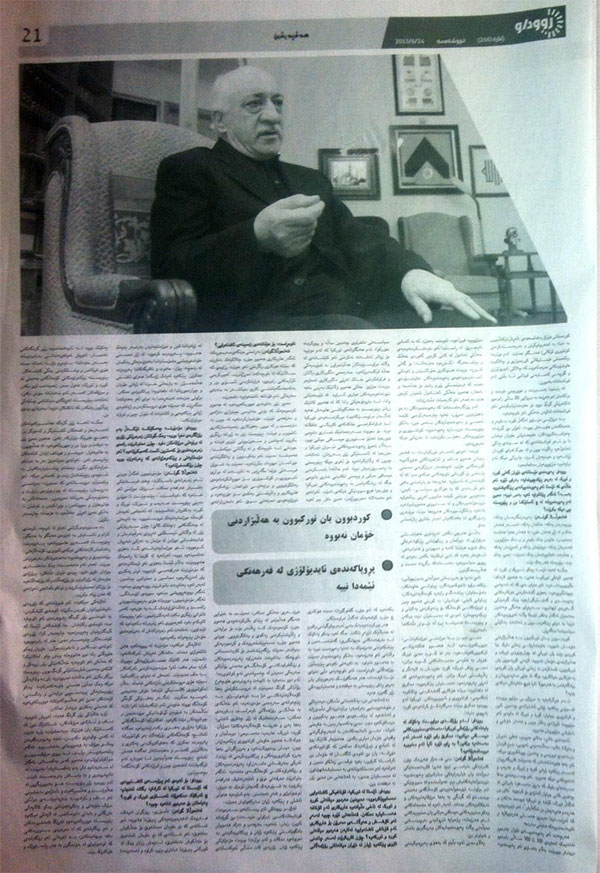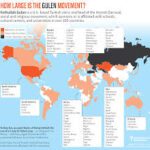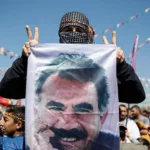Fethullah Gülen’s perspective on the Kurdish issue reflects a thoughtful effort to navigate the intricate dynamics of identity, unity, and political rights within the context of Turkish nationalism and Islamic solidarity. His perspectives highlight the importance of cultural and educational integration, which he sees as a way to connect the divides between Kurds and Turks. These efforts have elicited a range of responses, including both support and criticism, particularly concerning the perceived assimilationist objectives of the Hizmet (Gülen) movement.
Overview of Gülen’s Movement in Kurdish Regions
The Gülen movement, which has its roots in the wider Nur movement influenced by the notable Kurdish figure Said Nursi, was originally centred on the advancement of education and the cultivation of ethical values in Turkish society. Said Nursi, being of Kurdish origin, focused on the importance of Islamic unity rather than ethnic identity—a principle that has significantly shaped Gülen’s perspective. In regions populated by Kurds, especially in southeastern Turkey, Gülen’s educational initiatives commenced in the 1980s. Over the years, these efforts have expanded to create a notable presence through the establishment of schools, cultural institutions, and various initiatives focused on promoting socioeconomic development and enhancing educational opportunities.
Focus on Educational Programs
Gülen considers education to be a crucial approach to addressing the Kurdish issue. He supports the expansion of educational opportunities in Kurdish regions, frequently referencing instances of schools and universities that have been established in Iraqi Kurdistan and southeastern Turkey. Gülen argues that education serves as a mechanism for fostering unity, facilitating the integration of Kurds into Turkish society, and enhancing their economic opportunities. For example, Hizmet schools provide bilingual education, enabling Kurdish students to study both Kurdish and Turkish, which improves their job opportunities throughout Turkey. Furthermore, Gülen imagines these institutions as nurturing a generation that is less prone to separatism, instead cultivating “a generation of hope” through an education that highlights both technical skills and Islamic ethics.
Advocacy for Cultural Rights and Language
Gülen has expressed support for the acknowledgment of the Kurdish language in Turkey’s educational framework. He has advocated for the Turkish government to integrate Kurdish into educational curricula and to enhance its utilization in both private and public institutions. During an interview with Kurdish media group Rudaw in 2013, Gülen expressed that “Turkey should not only grant every right to its Kurdish citizens… but should also defend the rights of Kurds suffering in other parts of the world,” indicating a position that supports the broader rights of Kurds beyond Turkey’s borders.
Critique of Militant Kurdish Organizations
The contentious nature of Gülen’s position on the Kurdish issue is evident in his firm opposition to the Kurdistan Workers’ Party (PKK) and comparable organizations. Gülen has expressed criticism of the PKK’s militant tactics, describing them as harmful to the Kurdish cause and alleging that they contribute to ongoing violence that obstructs peaceful integration. He argues that the PKK’s separatist position threatens the social cohesion he considers essential for Turkey’s stability. Some Kurdish groups and PKK supporters have accused the Gülen movement of attempting to undermine Kurdish nationalism in favour of an assimilationist agenda.
The Function of Faith and Cohesion
Gülen’s perspective on Kurdish identity hinges on his interpretation of Islam as a cohesive element that surpasses ethnic differences. The assertion is made that religious identity ought to serve as a unifying factor between Turks and Kurds, proposing that a common Islamic heritage may mitigate nationalist or ethnic divisions. This perspective has been articulated through multiple Hizmet media channels, notably in the series “Tek Türkiye” (One Turkey), which portrays the journey of a Kurdish character navigating his identity in relation to Turkish unity and Islamic solidarity. The series faced criticism from certain Kurdish viewers for purportedly endorsing a pro-Turkish, anti-separatist perspective that downplayed Kurdish identity.
Efforts in Communication and Cross-Cultural Programs
The Hizmet movement has systematically facilitated dialogue between Kurdish and Turkish communities, notably through organized conferences and festivals. The Abant Platform, organized by Hizmet, has facilitated conferences aimed at fostering peaceful dialogue and exploring solutions to the Kurdish issue through a lens of mutual understanding and coexistence. In international contexts, such as the Anatolian Culture and Food Festival in the U.S., Kurdish cultural elements are showcased alongside Turkish ones, with the objective of promoting a sense of unity while preserving the unique Kurdish identity.
Examination of Assimilationist Tendencies
Critics contend that, despite these initiatives, the Hizmet movement’s approach may unintentionally support Turkish nationalist objectives by prioritizing integration rather than self-determination. Some critics in the Kurdish community argue that the movement’s emphasis on Islamic unity and the stability of Turkey undermines Kurdish identity and autonomy. The educational outreach of the movement, while advantageous for economic improvement, is perceived by some as an effort to cultivate a uniform, “Turkish-friendly” Kurdish community. The tension is heightened by Hizmet’s stance against Kurdish militancy, which, despite its non-violent principles, is viewed by some as supporting state interests that oppose Kurdish self-determination.
Final Assessment
Fethullah Gülen’s perspective on the Kurdish issue showcases a nuanced relationship among religious principles, educational initiatives, and political strategy. He supports Kurdish cultural and linguistic rights within the context of national unity; however, his criticism of the PKK and focus on Islamic identity rather than ethnic identity lead to tension with Kurdish nationalists. Gülen’s vision, grounded in the ideals of the Nur movement, advocates for a harmonious Turkey where Kurds and Turks live together under a common Islamic identity; nonetheless, the response to this vision is mixed. Some Kurds recognize Hizmet’s educational and economic contributions, while others perceive it as an effort at cultural assimilation, highlighting the ongoing complexities of the Kurdish issue in Turkey.
By: NAT Editorial Team



